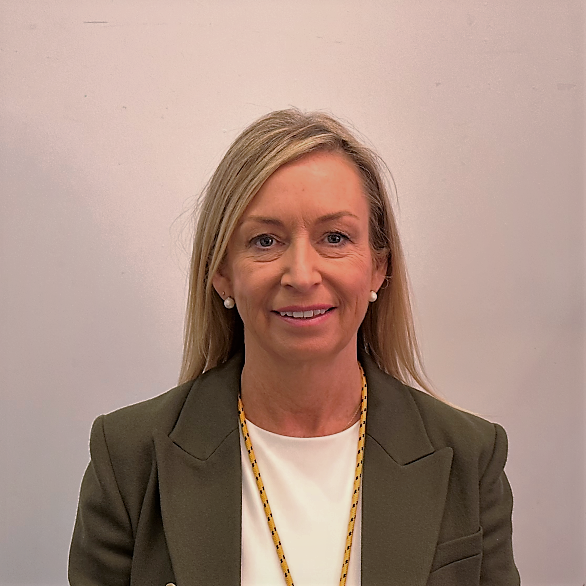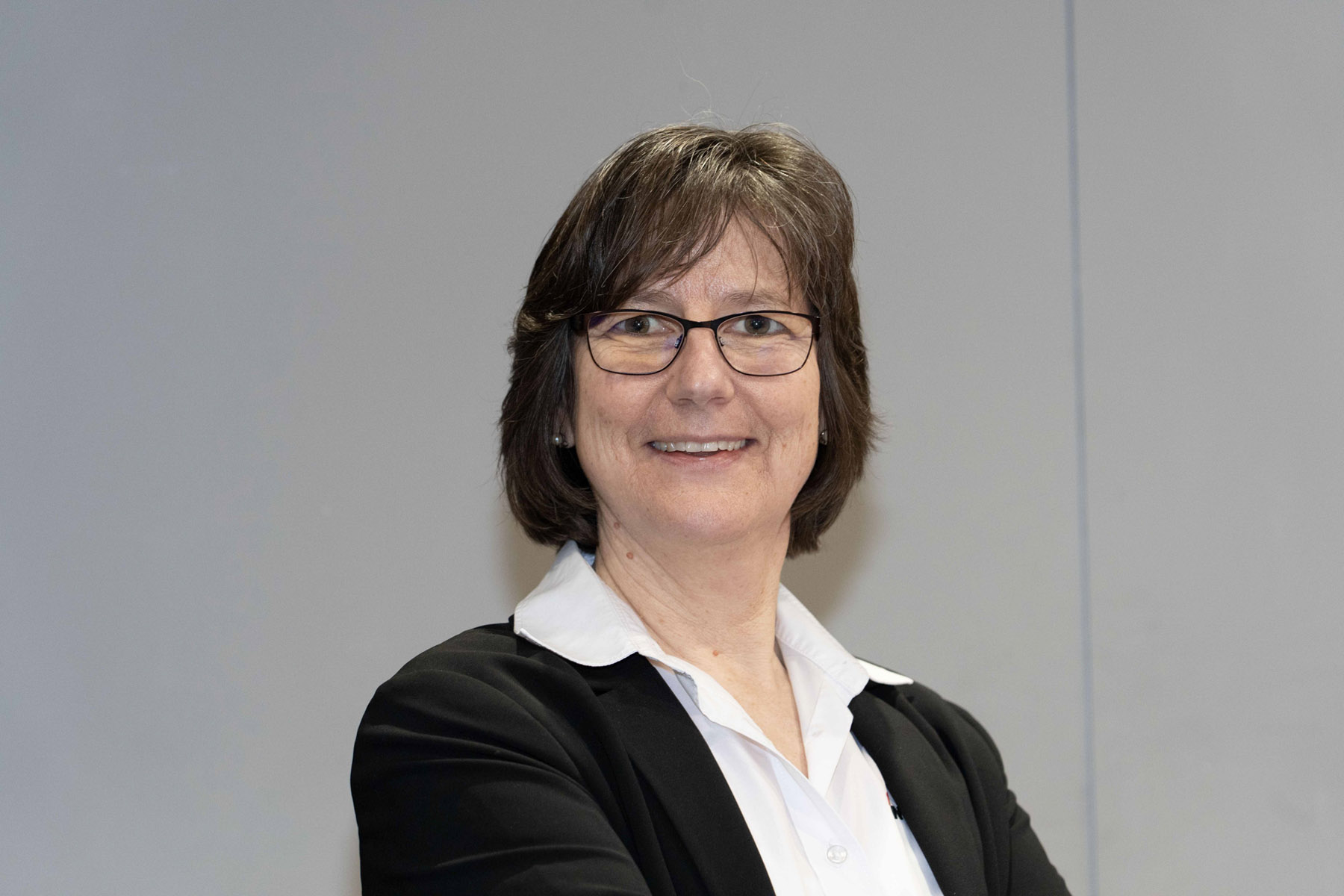International Women’s Day at Jungheinrich
8th March 2024

This International Women’s Day, two Jungheinrich UK leaders talk about their careers, their greatest successes and challenges, and opportunities for women.
Karen Taylor Ronson (pictured) is a Jungheinrich Business Director, responsible for customer service and sales. After 24 years with the Jungheinrich where she was responsible for the operational and customer service side of the business Karen has now also taken responsibility for the sales, racking and used equipment operation.
What makes a great business director?
Karen: “Firstly, it’s about looking after our employees as they are our biggest asset. Then it’s about knowing what works for the customer. Throughout my time with Jungheinrich I have learned to identify what makes the customer happy but to also see the warning signs of what could become an unhappy customer. And it’s at that point where we need to act. Customer service is not just about solving problems – it’s about customer retention. And ensuring we have the right service package for the customer is a big part of the sales process. My job as business director is to ensure we sell the right solutions for each customer.”
After studying business administration, Silke Herrera’s first job was with Jungheinrich in Hamburg. In the 32 years since, she has headed departments in Germany, been Finance Director for Jungheinrich Spain and MD of Jungheinrich Chile, before becoming UK Finance Director in 2023.
What has been your greatest challenge?
Silke: “Going to Chile in 2018 as an MD. It was a relatively new country for Jungheinrich [having previously operated via dealership] and there was a lot of development and training necessary to make people understand our business model and improve the processes to offer the best service to the customers. Also, working in a different culture is always challenging, but all the wonderful experiences I would never want to miss!”
As a woman in intralogistics, what obstacles have you had to overcome and how have you done it?
Karen: “When I first joined, I was the only female in an operational role. It’s only in the last 10 years or so we have started to see an interest from other females, and we now have female engineers, apprentices, and Area Service Managers. And the same can be said for the sales side of the business where we now have female salespeople, regional sales managers, and heads of sales. However, 24 years ago, I did face some resistance from customers and internal colleagues. There were some very standard questions directed to me, for example ‘what do you know about repairing forklift trucks?’ ‘What do you know about logistics?’. My standard response in those days was, “Richard Branson can’t fly a jumbo jet, but he makes a very good CEO of Virgin Airways.” It wasn’t my job to know how to fix a forklift truck. It was my job to support the teams in making sure they could get the right tools, support and training to do their jobs.”
Silke: “Sometimes the idea of women leaders could be challenging for men, even if they didn’t say anything. I feel that women have to work harder to show they can do it.”
How do you deal with stress?
Karen: “Take a deep breath, take a step back and look at the bigger picture. I very rarely panic and always take a pragmatic approach. And I always tell my team, “You can only do what you have the capacity to do”. You’ve got to prioritise and focus on what you can reasonably change rather than worrying about everything that’s outside your circle of influence. Outside of work I coach (and train) at a female only boxing club — that’s a great stress relief. I am qualified to deliver the fundamental principals of professional boxing training and functional fitness.”
Silke: “I am generally a positive thinking person and I feel very lucky that I am able to treat the next day as another day. I don’t take things personally and I try to look forward, not back. Also, I always have faith in myself to say, “I will do it. I will find a way. I will find a solution.” It helps that my family have supported me always. My husband, especially, is a big supporter. Whenever I have a problem, he listens to me and helps me get rid of my anger or stress.”
Who has been your inspiration in Jungheinrich?
Silke: “When I started we had one woman on the board, the famous Mrs. Martin. She was responsible for Finance and HR. She knew Dr. Jungheinrich personally. She was not my direct boss, but she was the board member for my department. It was inspirational to see a women in that role at that time. She was very close to the people and she would always ask how you were and ask about your family — a completely approachable person. This is what I try to be, part of the team and showing respect to all members. This was my message at last year’s conference: everybody has an important role to play, some at the front and others at the back office. Without the defence and midfield playing their part, the top strikers would never score a goal.”
What is your proudest achievement at Jungheinrich?
Karen: “My proudest achievement is that I broke the mould and the perception that women can’t succeed in this industry. But I am really proud of the fact that in my Region we have a great team spirit. We’re a strong team. I encourage an open and honest approach with the everyone and I believe that work should also be fun. If there is a work event such as a family fun day, or just an evening out for drinks we always get a good turnout. The sales team arrange and fund a Christmas weekend away between themselves and I know that would never happen without their being a great team spirit.”
What is the most important thing that you have learnt in your role?
Silke: “When I started at Jungheinrich, I had a specialist role and worked more on my own. With the time and taking over leadership roles, I learnt to be a team player and to give the team members flexibility and the ability to learn from their mistakes. The higher you get, the more you really have to trust your team. Something else I have learned is to put myself in the role of the other to understand their point of view and their needs. For example, when it comes to a decision my boss has to take, I try to be a step ahead and prepare the decision with facts and figures, and also to build my own opinion and give a recommendation. The same I would expect from my team, not to come up with problems and open questions, but with a proposal as they are the experts.”
How can encourage a more diverse workforce?
Karen: “I think articles like this are a great way, but we must change the perception of the intralogistics business. It’s not just about repairing forklift trucks, it’s not a heavy lifting job, it’s not all about dirty, oily environments. Yes, there is an element of that, but a big part of our business is about automation – it’s the future. Its high-tech and it’s developing all the time. There’s just so much for youngsters and females coming into this business to learn.”

Silke Hererra
Silke: “We need to be flexible as a company and find good solutions to combine the job with the family, hybrid working is a good step forward. But we also should encourage women to feel that they are able to follow a career path and take leadership roles.
On International Women’s Day, what would you say to women who may not have considered a career in intralogistics?
Karen: “I would say don’t judge a book by its cover. Just because it doesn’t sound glamorous, doesn’t mean it isn’t exciting and challenging. Explore the options, look at our website, talk to people who work in the industry. Many females must dismiss our job adverts thinking it’s not an environment for women. Think outside the box – I did.”
Read more…
First Time Females Qualify For Forklift International Finals

